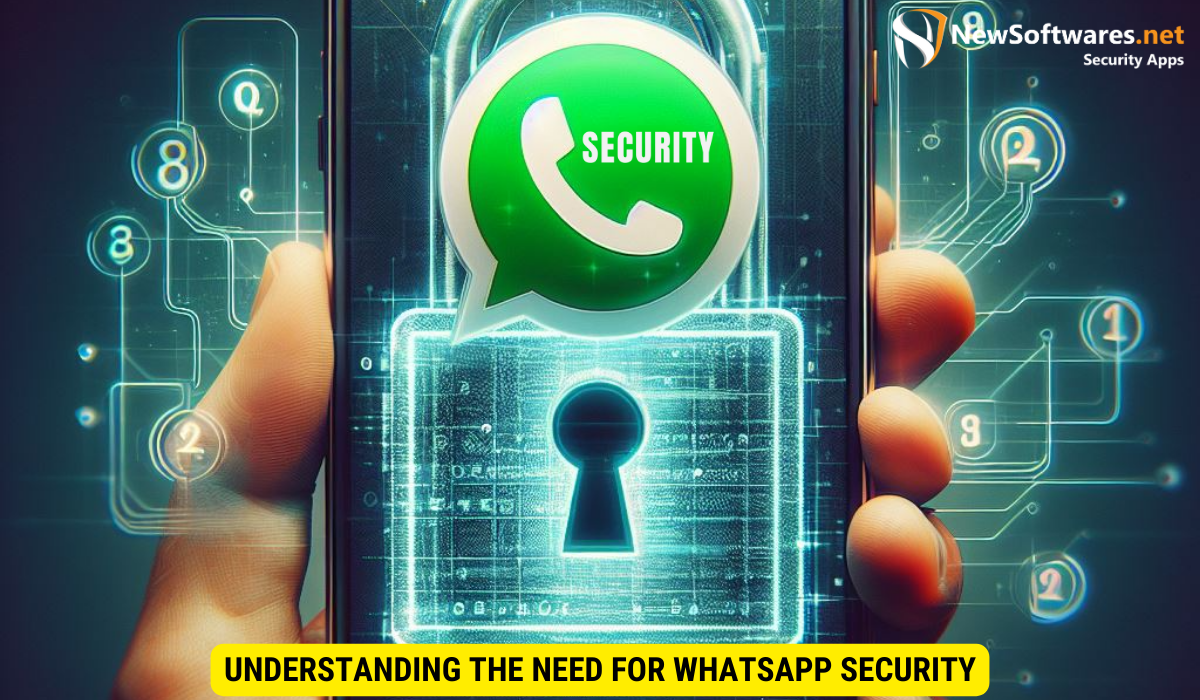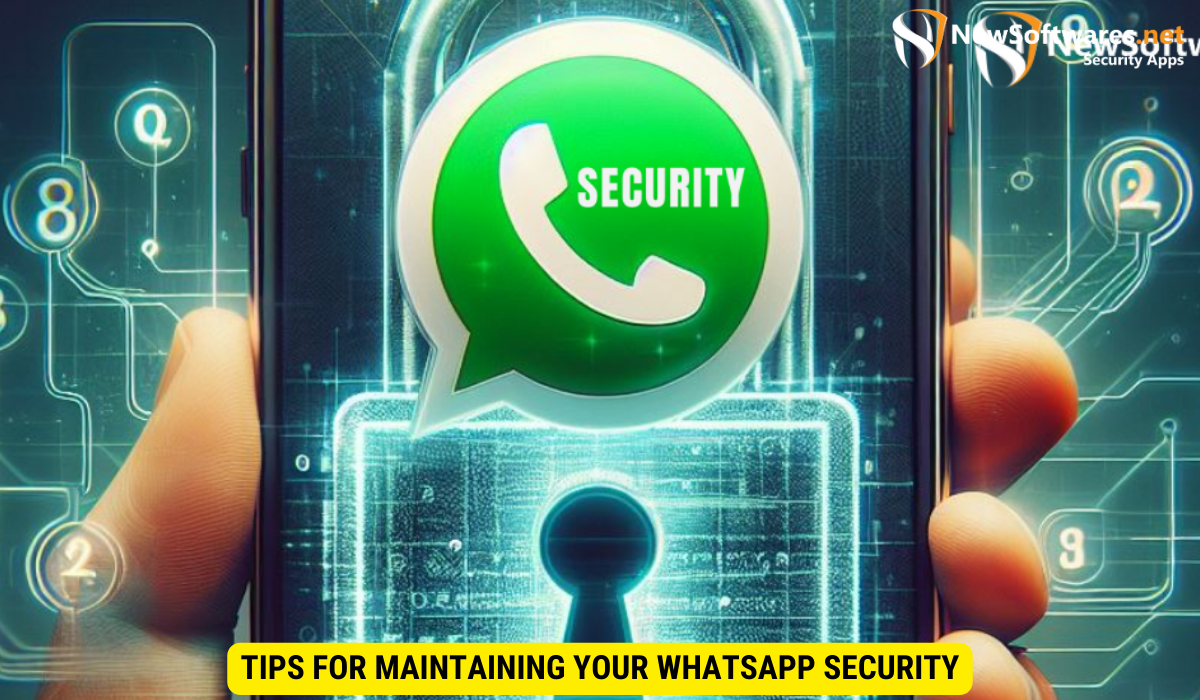To lock WhatsApp with a password, you can enable either two-step verification or fingerprint lock within the app’s settings for added security.
In today’s digital age, privacy and security are of utmost importance. With our personal information at risk, it’s essential to take necessary precautions to protect our online conversations. WhatsApp, being one of the most popular messaging applications, understands this concern and provides various built-in privacy features. However, to further enhance your security, you can also explore third-party apps. Together, we will discuss the importance of locking WhatsApp with a password and guide you through the steps to ensure the safety of your conversations.
Understanding the Need for WhatsApp Security

The Importance of Privacy on Social Media:
In a world where social media platforms are vital components of our daily lives, protecting our privacy becomes crucial. WhatsApp has over two billion active users worldwide, making it an attractive target for hackers and other malicious entities. Therefore, understanding the necessity of WhatsApp security is crucial for keeping your personal and professional conversations safe.
Furthermore, with the rise of cyber threats and data breaches, safeguarding your online communications has never been more critical. WhatsApp, being a popular messaging app known for its end-to-end encryption, provides a secure platform for users to exchange messages. However, staying vigilant and proactive in enhancing your WhatsApp security measures is key to mitigating potential risks.
Risks of Unsecured WhatsApp Conversations:
Having unsecured WhatsApp conversations can lead to severe repercussions. Hackers can access your personal information, including your conversations, photos, and videos. They can use this data for fraudulent activities or even blackmail you. To prevent such risks, it is essential to lock your WhatsApp with a password.
Moreover, the threat landscape in the digital realm is constantly evolving, with cybercriminals employing sophisticated techniques to breach privacy barriers. By neglecting the security aspects of your WhatsApp account, you not only put your personal data at risk but also compromise the confidentiality of your communications. Implementing multi-factor authentication and regularly updating your app can fortify your defenses against potential cyber attacks.
Exploring WhatsApp’s Built-In Privacy Features
WhatsApp understands the importance of privacy and security, providing several built-in features to safeguard its users’ conversations. Let’s take a closer look at two of these features:
Enabling Two-Step Verification:
Enabling two-step verification adds an extra layer of security to your WhatsApp account. With this feature, you will need to enter a passcode, alongside the SMS or email verification, each time you set up WhatsApp on a new device. This ensures that even if someone manages to access your SIM card, they won’t be able to activate WhatsApp without the passcode.
Two-step verification is a crucial security measure that helps prevent unauthorized access to your WhatsApp account. It acts as a barrier against potential hackers or unauthorized users trying to gain entry into your private conversations. By setting up this feature, you are proactively taking steps to enhance the security of your account and protect your sensitive information from falling into the wrong hands.
Using Fingerprint Lock:
WhatsApp’s fingerprint lock feature allows you to lock and unlock your WhatsApp conversations using your device’s biometric authentication, such as your fingerprint. By enabling this feature, you add an additional level of security to your WhatsApp account, as only your unique fingerprint can grant you access to your conversations.
Biometric authentication, like fingerprint scanning, is a cutting-edge technology that provides a secure and convenient way to protect your private messages. Your fingerprint is unique to you, making it an excellent tool for ensuring that only you can access your WhatsApp chats. This feature not only enhances the security of your account but also offers a seamless user experience, allowing you to quickly unlock your conversations with just a touch of your finger.
Third-Party Apps for Additional WhatsApp Security
While WhatsApp’s built-in privacy features are highly effective, using third-party apps can provide additional security and customization options. However, it’s crucial to choose the right app and follow the appropriate steps to ensure your conversations remain protected.
When it comes to safeguarding your WhatsApp chats and ensuring the privacy of your messages, exploring third-party applications can offer an extra layer of security and peace of mind. These apps can enhance your overall WhatsApp experience by providing features that may not be available in the standard version of the messaging platform. From encrypted messaging to advanced privacy settings, third-party apps can cater to specific security needs that users may have.
Choosing the Right Third-Party App:
When selecting a third-party app for additional WhatsApp security, make sure it comes from a reputable developer and has positive user reviews. Research the app’s features, compatibility with your device, and its security protocols to ensure it meets your requirements.
Furthermore, consider the reputation of the developer and the app’s track record in terms of security updates and responsiveness to potential vulnerabilities. Opt for apps that have a history of prioritizing user privacy and data protection, as these are essential factors in maintaining the confidentiality of your conversations.
Setting Up a Password with a Third-Party App:
After selecting the appropriate third-party app, follow its guidelines to set up a password for WhatsApp. This password will act as an additional layer of security for your conversations. Make sure to create a strong and unique password that you haven’t used elsewhere. Avoid common password mistakes, such as using easily guessable patterns or personal information, as they can compromise the security of your conversations.
Additionally, consider enabling two-factor authentication if the third-party app supports this feature. Two-factor authentication adds an extra step to the login process, further securing your account from unauthorized access. By combining password protection with two-factor authentication, you can significantly enhance the security of your WhatsApp conversations and protect them from potential breaches.
Tips for Maintaining Your WhatsApp Security

Now that you have implemented the necessary security measures, it’s crucial to maintain them. Follow these tips to ensure your WhatsApp conversations remain secure:
WhatsApp is constantly updating its security features to stay ahead of potential threats. It’s important to stay informed about these updates and regularly check for any new security settings or options that can further enhance the protection of your conversations.
Regularly Updating Your Password:
Regularly update your WhatsApp password to protect against any potential security breaches. Consider changing your password every few months to maintain optimal security.
Additionally, consider using a password manager to generate and store complex, unique passwords for all your accounts, including WhatsApp. This can help prevent password reuse and enhance the overall security of your online accounts.
Avoiding Common Password Mistakes:
To enhance the security of your conversations, avoid common password mistakes such as using easily guessable patterns, simple words, or personal information. Opt for a complex combination of uppercase and lowercase letters, numbers, and special characters.
Furthermore, enable two-step verification on your WhatsApp account for an added layer of security. This feature requires a secondary code to access your account, making it even more challenging for unauthorized users to gain entry.
Troubleshooting Common Issues
Despite taking all the necessary precautions, you may encounter certain issues while locking WhatsApp with a password. Here are a couple of common problems and their solutions:
What to Do if You Forget Your Password:
If you forget your WhatsApp password, it’s understandable to feel concerned. However, there’s no need to panic. You can usually recover your password by following the app’s account recovery steps. Always ensure you have access to the registered email or phone number associated with your WhatsApp account.
Dealing with a Hacked WhatsApp Account:
If you suspect that your WhatsApp account has been hacked, take immediate action to regain control. Start by changing your password and enabling two-step verification, if not already done. Additionally, inform your contacts about the situation and advise them against responding to any suspicious messages sent from your account.
Now, let’s delve deeper into the steps you can take to recover your password. When you realize that you have forgotten your WhatsApp password, the first thing you should do is remain calm. Stressing out will only make it harder for you to think clearly and follow the necessary steps. Take a deep breath and relax.
Once you have composed yourself, open the WhatsApp application on your device. Look for the “Forgot Password” option, usually located below the login screen. Tap on it, and you will be directed to the account recovery page. Here, you will be asked to provide the registered email or phone number associated with your WhatsApp account.
After entering the required information, WhatsApp will send a verification code to your registered email or phone number. Retrieve the code and enter it into the designated field on the recovery page. Once you have successfully verified your identity, you will be prompted to create a new password for your WhatsApp account. Make sure to choose a strong and unique password that you haven’t used before.
Key Takeaways
- Locking WhatsApp with a password is essential for added security, even if you use biometric authentication.
- Explore built-in features like two-step verification and fingerprint lock for enhanced security.
- Consider using third-party apps for additional security measures and customization options.
- Regularly update your password and enable two-step verification to maintain WhatsApp security.
- Take immediate action if you suspect your WhatsApp account has been hacked, including changing your password and informing your contacts.
FAQs
Is locking WhatsApp with a password necessary if I already use biometric authentication?
While biometric authentication provides an additional layer of security, locking WhatsApp with a password adds another level of protection, especially in scenarios where biometric authentication may not be available or reliable.
Can I use the same password for multiple apps on my device?
It’s not recommended to use the same password for multiple apps, including WhatsApp, as it increases the risk of security breaches. Each app should have its unique and strong password for enhanced security.
What are some reliable third-party apps for additional WhatsApp security?
Some reputable third-party apps for enhancing WhatsApp security include AppLock, Norton App Lock, and Locker for WhatsApp. However, it’s essential to research and choose apps from trusted developers to ensure their reliability and security.
What should I do if I receive suspicious messages on WhatsApp?
If you receive suspicious messages on WhatsApp, refrain from interacting with them and avoid clicking on any links or attachments. Report the message as spam or block the sender if necessary. Additionally, consider enabling two-step verification for added security.
Is it possible to recover my WhatsApp conversations if my account is hacked?
If your WhatsApp account is hacked, you can regain access by changing your password, enabling two-step verification, and contacting WhatsApp support for assistance. However, recovering lost conversations may not always be possible, emphasizing the importance of preventive security measures.
